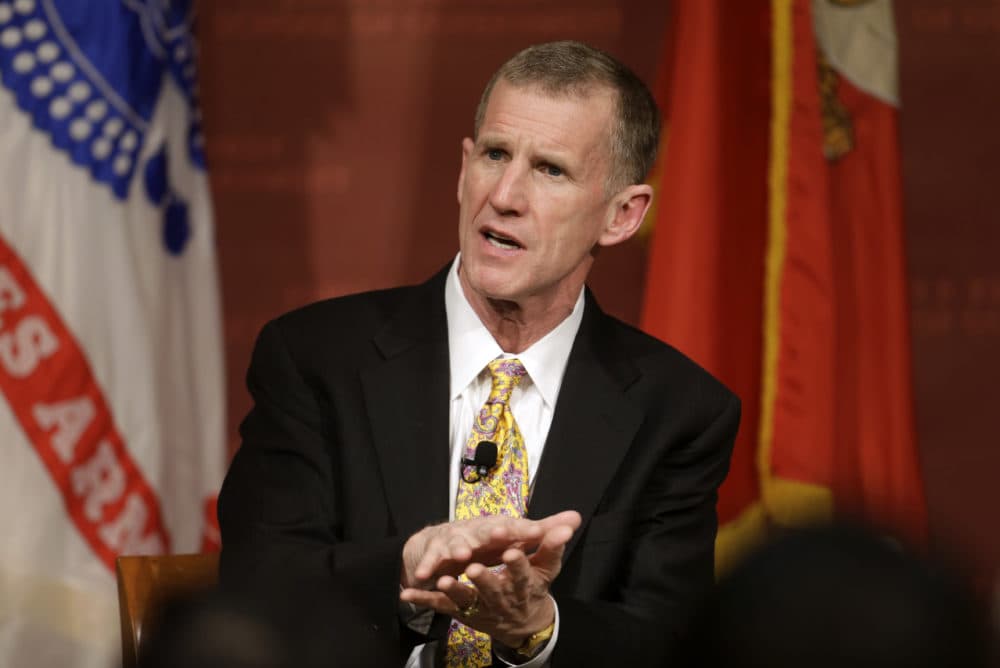Advertisement
Coronavirus Coverage
Army General Hired To Help Handle Boston's Coronavirus Response Talks Leadership, Readiness
Resume
As Boston prepares for the battle against COVID-19, Mayor Marty Walsh has tapped a retired four-star Army general to review all aspects of city government functioning and disaster preparedness.
Gen. Stanley McChrystal commanded all U.S. forces in Afghanistan in the mid-2000s, co-founded a management consulting company and co-authored “Team of Teams," a book on leadership. He joined WBUR's Morning Edition to discuss his role as Boston battles the pandemic and the need for a national, coordinated effort in the face of COVID-19.
Interview Highlights
On the parallels between fighting wars in a post-9/11 world and battling the coronavirus pandemic
In 2003, when I took command of the counterterrorist forces across the Middle East, what we found was Al-Qaida was a viral, amorphous threat — a little bit like COVID-19. It was different than we had ever seen from a terrorist threat before.
What it meant was we had to operate a networked response ... We had to be spread across 27 countries, but we needed to be able to collaborate and synchronize our efforts every 24 hours. It feels a little bit familiar. What we're doing now — this is a whole-of-nation effort. Not just government, not just medical, but in fact all the different stakeholders — we've got to coordinate them and focus them in a way that we can defeat the threat.
On effective leadership in times of dramatic change and uncertainty
The thing that I think is most important now is absolute honesty with the people that you lead; candor. People can deal with something very difficult ahead, even if it will be for an extended period, if we are very straight with them about it.
I also believe that you need to offer confidence. Most of us are old enough to know that crises will be bad, but we'll also get through them. Young people may not have experienced a crisis before, and they need that kind of confidence.
I also think that leaders have got to create an environment in which the different parts of the entity are not pulling in different directions, but they're all pulling the same sled moving forward; and that's a lot harder than it sounds.
On the need for national leadership at this time
We can't fight COVID-19 as 50 separate state fights. Now, there are many things that need to be very customized in different places, like in Boston or New Orleans or San Francisco. But the reality is there needs to be a pulling together of the national psyche and the national practical efforts — all the resources we can focus.
On The McChrystal Group's review of Boston's disaster preparedness
You look at the plans. You look at what people have put together for disaster plans — maybe natural disasters or other events — and typically across the city, you'll have plans from all of the separate entities of government; and then private entities will have plans as well. So you pull those plans together and then you see where the gaps are, you see where the overlaps are, and you start to say, 'OK, if we coordinate these plans better, can we be more efficient in the use of resources? Can we be more effective in focusing where things are needed?' And typically, in every area you find tremendous potential for improvement.
I would say that Mayor [Marty] Walsh and his team are far past the assessment phase. They started both assessing and acting right away, and very impressively.
On the need to support our health care workers
They are going to be the soldiers in the foxhole ... we can say how much we appreciate them, but on a daily basis they're going to be, one, in harm's way because of COVID-19, but two, they're going to ... watch very difficult things happening. And they are going to be, in many cases, unable to stop that. And just like a soldier in combat who loses comrades or sees civilians needlessly killed, there's a sense of frustration and guilt that comes from that. It may not be something they should feel, but it's natural that you feel it. So I think we have to be very, very thoughtful about our health care workers because they're going to be going into an experience that most of us are going to be far enough away from — that we can't totally appreciate.
This segment aired on April 2, 2020.
